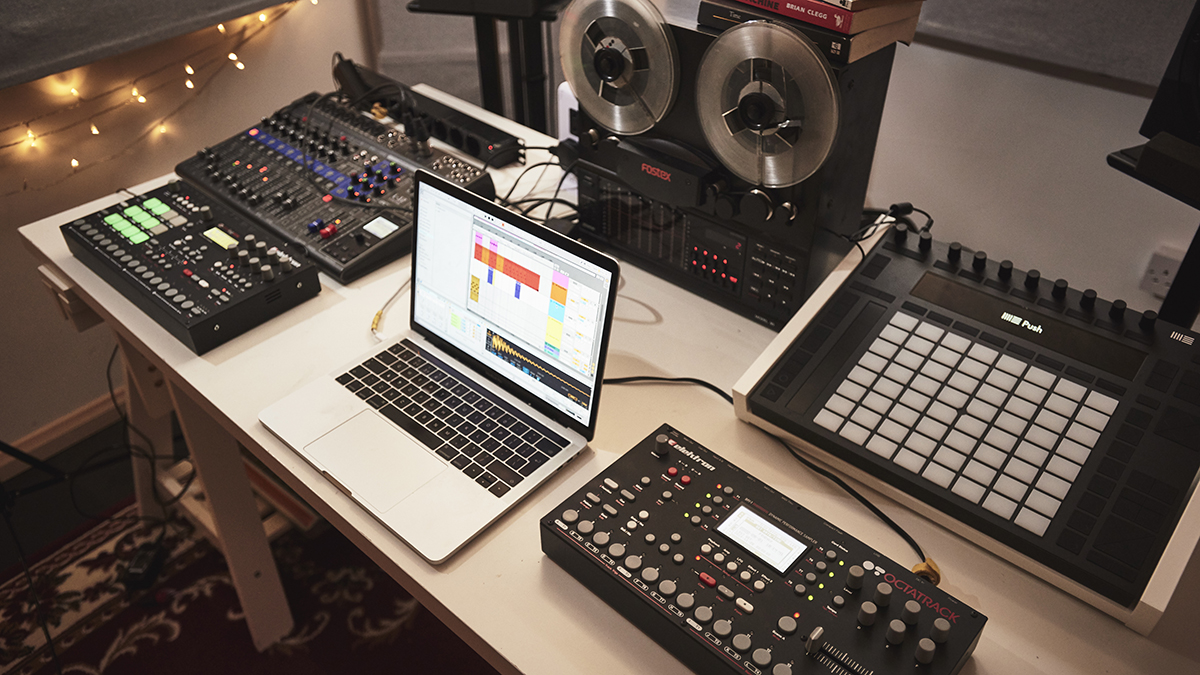The Track: Lia Mice breaks down Which Memories Will Make It?
From the conceptual album The Sampler As A Time Machine
Multidisciplinary artist and instrument designer Lia Mice has a unique take on techno that appeals to both the electronic music underground and the art world.
Her résumé includes such diverse highlights as supporting Objekt live and having her work exhibited at the Tate Modern, Barbican and V&A. We find out how she created the track Which Memories Will Make It? from her conceptual album The Sampler As A Time Machine.
What inspired your album’s time travel concept?
“I bought the Octatrack sampler so I could perform live without a computer. It was the only one that did what I really wanted it to do, which was record live into it and then be able to flex time to match with the drums. So, I can change tempo live and the sample will change tempo too.
It was the first hardware sampler I felt to be a really deep instrument that you could become... virtuosic with I guess? It offers so many opportunities for more personalised performance. It just really made me think more about samplers and what they are. Then I started reading some related books and I saw a DJ Spooky quote that was, ‘Sampling is like sending a fax to yourself from the sonic debris of a possible future’. It made me think about sampling as a way to move beyond the here and now, forwards and backwards in time.
That’s time travel, so the machine that allows you to do that is a time machine. I thought, ‘how far can I push this idea of the sampler being a time machine? Can I think of other ways of time travel and try to make the sampler conduct those?’ I like to be in the moment, and I like to use the sampler as a performative tool in the moment. It allows me to do more live because I’m not physically playing on those things, but I’m not reliant on a 20 person ensemble either. So it allows me to be more present in the moment rather than saving things for the future.”

The track’s main theme is degradation of memory, which we tend to think of as a tragic thing. Is that not the case for you?
Want all the hottest music and gear news, reviews, deals, features and more, direct to your inbox? Sign up here.
“The impermanence of things makes you appreciate the present moment. There’s also something to be said about feeling like... ‘this is finished, and this is how it is now. I’m not going to go back to it and change it.’ I think there is an element of beauty in degraded things – ruins and things becoming degraded, and maybe they don’t work anymore in the way they were intended to, but they have become something else. If you’re creating it to be slightly ruined to begin with, you’re making something that will sound different to how it would have otherwise.”
The sampler is a unique instrument in that mostly it requires an external sound source. Where do your samples come from?
“I like organic sounds, so I like sounds of real instruments. I might look for a particular instrument, a really high-quality sample of that instrument. I don’t even own any synths, so I might look for an interesting synth sound and use that in a different way than it may have been intended. I download sample packs, so I’m not going to really obscure places, but I’ll have the idea in mind first – I won’t go through a sample pack and then create an idea from a sound I find; I’ll audition sounds until I find the thing that works with that idea.”
Hardware
Apple MacBook Pro
Zoom L-12 Live Trak
Mackie HR824 x2
Elektron Octatrack Mk1
Elektron Analog RYTM Mk 1
Ableton Push 2
Shure SM57
Fostex Model 80
Elektron Digitone
Software
Ableton Live 10
Apple Logic Pro X
Soundtoys plugins
Would you say you’re going from a composition first approach rather than a sound design first approach?
“Yes. I’m not the fastest producer because I’m quite detail-oriented. So what I find is I need to draft a track really quickly, otherwise, I’ll just be tweaking a sound and I won’t have a track at the end; I’ll just have like one really great sound! So by drafting a track and telling myself, ‘Okay, I’ll come back to those parts and make them sound better later’. I’ll have the elements in place, and then if I want to come back and tweak that sound or replace that whole thing with another idea, then I will when I’m in the mode to get more detail-oriented.”
You use your own vocals on your tracks. How do you record those?
“I use a Shure SM57, that’s what I use live and in the studio. I try to get the cleanest vocal take that I can. I get up really close to the mic and sing very quietly and try to get that as cleanly as possible, then I’ll add so many effects. I’m processing my vocals and layering them so much that I think it would be a bit overkill if I then had an extremely expensive mic!”
The Sampler As A Time Machine can be ordered in vinyl and digital formats from the Lia Mice website and issue 355 of Future Music is on sale now.



I take care of the reviews on MusicRadar and Future Music magazine, though can sometimes be spotted in front of a camera talking little sense in the presence of real musicians. For the past 30 years, I have been unable to decide on which instrument to master, so haven't bothered. Currently, a lover of all things high-gain in the guitar stakes and never one to resist churning out sub-standard funky breaks, the likes of which you'll never hear.